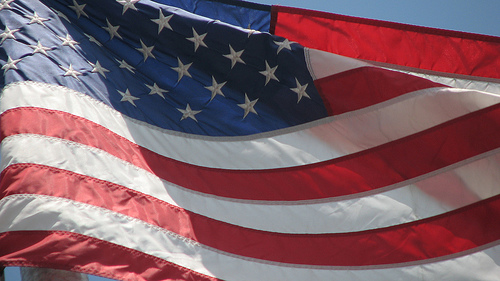
Twenty-first century science and technology make it possible for all the world’s people to have good food, good health, good education, a good job and a fulfilling life.
What stands in the way? Capitali$m – an economic and political system that puts profits before people.
Q: What’s wrong with capitalism?
A: It puts profits before people.
The heart of capitalism is the drive for more and more profits for banks and corporations no matter what happens to our nation’s people and environment. The results of this built-in greed are horrible:
20 million people out of work, including 25% of our young adults.
Exporting jobs to wherever workers get paid the least. Wiping out American industry.
Draining the public treasury with tax breaks and bailouts for the super-rich and giant corporations.
People’s needs go down the toilet. Public schools, health services, parks, libraries, and transit systems are cut back or closed.
Poisoning our drinking water, air, food supply and oceans.
Cutting workers’ pay and benefits, stealing pensions.
Corruption of Congress and our democratic institutions by corporate dollars and lobbyists.
Denying workers the right to join unions.
Record levels of inequality.
Greed for profits is the impetus for war – for oil, for domination of other countries’ markets and profits of military contractors.
Capitalism foments racism, sexism, homophobia and anti-immigrant campaigns.
Capitalism is un-American. Instead of life, liberty and the pursuit of happiness, it traps us in a political system and economy focused on greed and the pursuit of private profits.
FACT: The richest 400 people in America have more wealth than 155 million other Americans combined!
FACT: The average corporate executive makes $500 for every $1 paid to the average worker even though it is the workers who actually create our nation’s wealth.
In a socialist economy, people come first, not profits
Socialism means re-structuring our economy to be fairer and more democratic.
Right now Americans already produce our nation’s wealth socially. We work together in factories, offices, schools, stores, laboratories, hospitals and on farms and construction sites.
What’s not decided together is how the wealth we create could be fairly distributed. In a socialist economy, there would be social ownership and social control instead of private ownership and control.
The people would decide. The deciding factor would no longer be what’s best for corporate profits.
Banks, oil companies, utilities and key sectors of the economy such as steel and transportation would be publicly owned and operated.
Small business would still be a vital part of the process
There would be enough resources freed up to fully fund public education, health care, mass transit, child care and any other priorities the American people decide on.
In a socialist society, people would get paid for the work they do and rewarded for the initiatives they take. The difference? No corporate big shots getting paid billions for the work others do.
War, racism, sexism and homophobia would lose their corporate sponsors.
Reversing climate change, developing green industries, and sustainability would be top priorities. No doubt millions of young people would lead the way with such initiatives.
The rich and diverse multi-cultural American heritage could flourish in music, literature, dance, sports, film and art.
Bill of Rights socialism
Socialism in the United States would be built on the strong foundation of our Constitution’s Bill of Rights, guaranteeing freedom of speech, freedom of religion and equality for all. Other fundamental rights, such as the right to a job, health care and education could be added.
A socialist society would need to create organizations at the grass roots level to assure democratic controls.
Americans already have great traditions of such grass roots organizations such as town hall meetings, PTAs, unions, churches and charitable organizations. In a socialist society, we could expand those traditions to make our country’s economic life more democratic.
Another world is necessary – and possible!
How do we get there?
Capitalism in the United States can and will be replaced with a people-first socialist system. This will happen when a majority of our country’s people are convinced of the need for such revolutionary change and are ready to make it happen.
To make that change will require a very broad coalition, a movement with workers, including unemployed workers, at its heart. This coalition must also include small business people, students and professionals. The union movement as well as African American, Latino, Asian American, immigrant and Native American communities will be central parts of that alliance. The involvement of youth, women, seniors, the LGBT community, environmentalists and people of faith is vital. It will be the same kind of people’s movement that is fighting for progress today, but even bigger and broader.
We can gain this majority by uniting for people’s needs. That means combating racism, sexism, anti-immigrant hysteria, and homophobia. It means showing in the course of grass roots struggles how these are used to divide and conquer the movement for progressive change. In the fight for jobs, education, the environment, health care, peace and human rights, at the workplace, at the polling place and in the community, this unity can be built.
Americans already have lots of experience with public ownership
Here are some examples:
Bank of North Dakota – founded in 1919, its profits go to benefit the people of that state.
Credit union – 87 million Americans participate in these local financial institutions that are owned and controlled by their members.
Cleveland Public Power – which provides electricity at affordable rates to that city.
Cooperative societies – farmer co-ops, housing, co-ops, food co-ops, etc.
Union pension funds.
Social Security.
Veteran’s Administration health care network.
16,000 municipally owned and operated sewage treatment systems.
Tennessee Valley Authority – provides electrical power for 8.5 million Americans in 7 states.
Some famous American socialists: Angela Davis, Juan Chacon, W.E.B. DuBois, Paul Robeson, Helen Keller, Woody Guthrie, Eugene Debs, Susan B. Anthony, Elizabeth Gurley Flynn, Albert Einstein.


 Join Now
Join Now